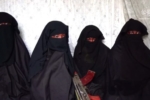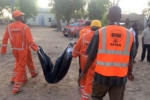The release of 21 Chibok girls by the terrorist Boko Haram group Thursday was the culmination of more than two years of negotiation and perseverance by a team which first assembled about two years ago, PREMIUM TIMES can report.
The key actors who first initiated the process made their initial attempt to rescue the girls around July 2014, during the Goodluck Jonathan administration, but that effort floundered in the last minutes, PREMIUM TIMES learnt.
The initial team comprised Shehu Sani, now a senator; rights activist, Fred Eno; a lawyer, Mustapha Zanna; the Nigerian Army, then led by Kenneth Minimah; the Swiss government; and the International Committee of the Red Cross, which was called in to play a neutral intermediary role.
Mr. Sani, the sources said, began the process when he reached out to the Swiss Government through its Embassy in Nigeria and then linked them to Mr. Zanah who in turn connected the Swiss authorities and the International Committee of the Red Cross with the leadership of Boko Haram.
Mr. Jonathan appointed elder statesman, Edwin Clark, to liaise with the team and government.
After a few weeks of work, the team nearly secured the release of the girls in 2014.
Highly placed sources familiar with the negotiation told PREMIUM TIMES at the time that the deal fell through due to the clumsy manner in which the Jonathan administration handled it.
“It boils down, basically, to three key issues: inflexibility and lack of realism on the part of the insurgent forces; lack of support for a negotiated settlement to the insurgency on the part of security forces; and what appears to be government’s acceptance that the security forces were right,” the sources said.
“The president desperately wanted the girls released, but politics of positioning stood in the way of progress,” Mr. Eno told PREMIUM TIMES at the time.
After the initial effort failed, according to our sources, Messrs Sani, Eno and Clark moved on to other things.
But other members of the team remained tenacious and kept exploring available options for the release of the girls, this newspaper learnt.
The State Security Service (SSS) led the fresh negotiation with the team using the existing line of dialogue established in 2014.
The Nigerian military was left out of the initial negotiation after the Boko Haram leadership reportedly insisted it would have nothing with an organisation that had been killing its members, and had killed some of the Chibok girls in aerial bombardments.
PREMIUM TIMES learnt that the SSS was therefore enlisted to lead the negotiation, gather intelligence regarding the reliability of the release window and provide other support services essential to the operation.
After a deal had been struck, the Red Cross was called in to meet the leadership of the sect as well as sight the girls.
A date and location was then agreed for the release of the girls.
On Wednesday, October 14, the military was contacted to deploy some of its men to a particular location in Banki, a border town in Bama local government area of Borno State, to pick up the 21 girls, officials said.
The girls were released at 5:30 am on Thursday and immediately flown to Maiduguri, the Borno State capital, in a chopper.
The Nigerian government announced the release of the girls on Thursday morning, hours after they were successfully received from insurgents in the highly confidential operation.
The Minister of Information and Culture, Lai Mohammed, dismissed reports that the girls were rescued in exchange for top-level suspected Boko Haram detainees across the country.
The release was a “product of painstaking negotiations and trust on both sides,” Mr. Mohammed said at a world press conference Thursday afternoon. “Please note that this is not a swap. It is a release.”
Mr. Mohammed’s comments that the girls were not released based on a prisoner swap deal immediately sparked speculation that the government may have paid ransom.
However, presidential spokesperson, Femi Adesina, denied that any ransom was paid.
Mr. Buhari had repeatedly stated his willingness to rescue the girls even if it required swapping them with suspected terrorists in custody.
A government source said negotiations for the release of the remaining girls was continuing.
This page has been viewed 543 times
Tags : Breaking news, CHIBOK






























